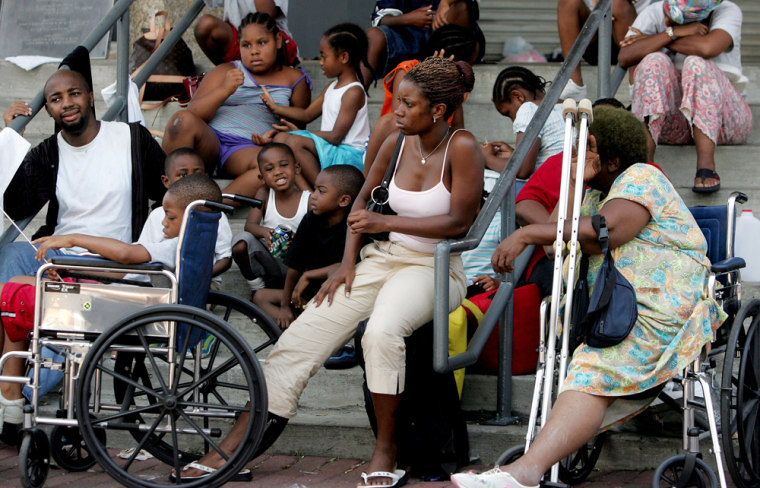Whatever the reasons, residents of heavily Republican Texas seemed to get better treatment from the government during Hurricane Rita than the mostly black, poor and Democratic victims of Katrina in Louisiana. The issue of race is likely to linger in the aftermath of the two big storms.
Government mistakes in the first storm, including failure to provide a means of evacuation for tens of thousands of New Orleans residents stranded in flooding low-lying areas, exposed racial and social fault lines.
These divides may be reinforced, rather than diminished, by the government’s far more robust response to Hurricane Rita.
Texas is the president’s home state, has a Republican governor and is the home of big oil. New Orleans before Katrina was heavily populated by poor blacks who vote Democratic.
‘Affluency made a heck of a difference’
With Katrina, “poor folks were told to evacuate, and they had no means to do it. In Texas, we had a different type of situation. But even there, the local, state and government failed those people,” said Rep. Charles Rangel, D-N.Y. “Not to the extent they did with Katrina. But there’s no question that affluency made a heck of a difference.”
President Bush, vacationing at his Texas ranch as Katrina approached in late August, was a whirlwind of activity this time. He bounded from one command post to another over the weekend to monitor Rita, first to Colorado, then to Texas and then to Louisiana. He went to the Energy Department on Monday for a briefing and planned to visit storm-affected areas in Texas on Tuesday.
The evacuation of some 3 million residents ahead of Rita kept casualties tiny. Armies of rescuers, relief workers and U.S. troops swept through stricken areas. Officials at all levels of government could be seen working together.
It provided a marked contrast to the Katrina images beamed around the world: families stranded on rooftops, looters in devastated neighborhoods, refugees huddled in the Superdome and Convention Center, floating bodies, the president catching his first glimpse of the destruction two days after the storm from a window on Air Force One.
Trying to make up for Katrina
“Rita was Bush putting on a show,” said David Bositis, a senior political analyst at the Joint Center for Political and Economic Studies, a think tank focused on black issues. “Bush and his people took a lot of heavy hits in their response to Katrina. They wanted to be sure that this time around they projected an image of effectiveness.”
Bositis said Bush’s performance did next to nothing to improve his deeply unpopular image among blacks.
Bush and Republican Party chief Ken Mehlman have worked to cultivate blacks, including overtures to black ministers, in hopes of giving the party a better shot at luring black votes in the future. Bush got 9 percent of the black vote in 2000 and 11 percent in 2004, according to exit polls.
The president met privately on Friday with NAACP President Bruce Gordon. “They ... talked about ways we can work together on shared priorities,” said Bush spokesman Scott McClellan.
Bush’s advocacy of “faith-based” government initiatives and opposition to gay marriage resonated among some blacks in 2004, analysts suggested.
“Now, Katrina is a bellwether issue for a lot of people. And it means it’s going to complicate his relationship with some of these ministers and their parishioners,” said Ron Walters, a political science professor at the University of Maryland who specializes in black politics.
An affront to the black community
Many blacks “have deep emotional questions” on the treatment of storm victims, Walters said. “A lot of these people are their kin. The social network of the black community is spread throughout the South.”
Bush, asked by a reporter on Monday about suggestions by some blacks that the administration is insensitive to the plight of urban blacks, said: “I can assure you that the response efforts and now the recovery efforts are aimed at saving everybody.”
Still, he said, the hurricanes exposed Americans to a view of “some poverty they had never imagined before. And we have to address that, whether it be rural or urban.”
In an AP-Ipsos poll earlier this month, three-fourths of blacks surveyed felt the government would have responded faster if the victims of Katrina weren’t poor and mostly black; just 25 percent of whites felt that way.
Democrats have seized on the divide as political ammunition for upcoming 2006 midterm elections. “Bush’s failed leadership on African Americans,” trumpets a Democratic National Committee press release.
Suggesting inflated rhetoric on both sides, Earl Black, a political scientist at Rice University in Houston, said: “My view is that it’s probably not wise for anybody to make too much partisan hay out of tragedies.”
